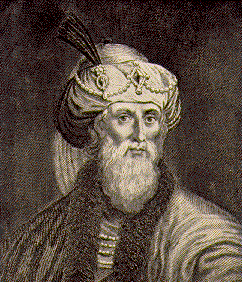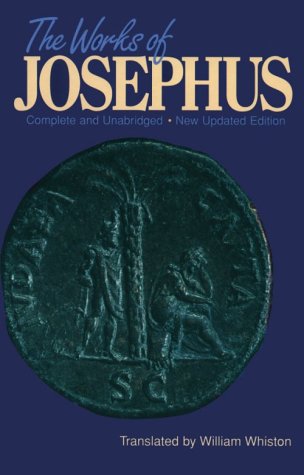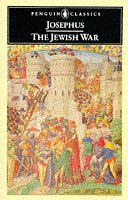
The Works of
Flavius Josephus
Translated by
William Whiston

The Antiquities of the Jews
Preface to the Antiquities of the Jews
Book I
--
From Creation to the Death of Isaac
Book II --
From the Death of Isaac to the Exodus out of Egypt
Book III
--
From the Exodus out of Egypt to the Rejection of the Generation
Book IV --
From the Rejection of that Generation to the Death of Moses
Book V --
From the Death of Moses to the Death of Eli
Book VI --
From the Death of Eli to the Death of Saul
Book VII -- From the Death of Saul to the Death of David
Book VIII
-- From the Death of David to the Death of Ahab
Book IX -- From the Death of Ahab to the Captivity of the Ten Tribes
Book X -- From the Captivity of the Ten Tribes to the First Year of
Cyrus
Book XI -- From the First Year of Cyrus to the Death of Alexander the
Great
Book XII
-- From the Death of Alexander the Great to the Death of Judas
Maccabeus
Book XIII
-- From the Death of Judas Maccabeus to the Death of Queen
Alexandra
Book XIV -- From the Death of Queen Alexandra to the Death of Antigonus
Book XV
-- From the Death of Antigonus to the Finishing of the Temple by
Herod
Book XVI -- From the Finishing of the Temple by Herod to the Death of
Alexander and Aristobulus
Book XVII -- From the Death of Alexander and Aristobulus to the
Banishment of Archelaus
Book XVIII
-- From the Banishment of Archelaus to the Departure of the
Jews from Babylon
Book XIX -- From the Departure of the Jews from Babylon to Fadus the
Roman Procurator
Book XX -- From Fadus the Procurator to Florus
The War of the Jews

Preface to the War of the Jews
Book I -- From the Taking of Jerusalem by Antiochus Epiphanes to the
Death of Herod the Great
Book II -- From the Death of Herod till Vespasian was sent to subdue the
Jews by Nero
Book III -- From Vespasian's coming to Subdue the Jews to the Taking of
Gamala
Book IV -- From the Siege of Gamala to the Coming of Titus to besiege
Jerusalem
Book V -- From the Coming of Titus to besiege Jerusalem to the Great
Extremity to which the Jews were reduced
Book VI -- From the Great Extremity to which the Jews were reduced to
the taking of Jerusalem by Titus
Book VII -- From the Taking of Jerusalem by Titus to the Sedition of the
Jews at Cyrene
The Life of Flavius Josephus - Autobiography
Josephus's Discourse to the Greeks concerning Hades
Flavius Josephus Against Apion
Book I
Book II
Flavius Josephus
Josephus' first work, Bellum Judaicum (History of the Jewish War), was
written in seven books between AD 75 and 79, toward the end of
Vespasian's reign. The original Aramaic has been lost, but the extant
Greek version was prepared under Josephus' personal direction. After
briefly sketching Jewish history from the mid-2nd century BC, Josephus
presents a detailed account of the great revolt of AD 66-70. He stressed
the invincibility of the Roman legions, and apparently one of his
purposes in the works was to convince the Diasporan Jews in Mesopotamia,
who may have been contemplating revolt, that resistance to Roman arms
was pure folly. The work has much narrative brilliance, particularly the
description of the siege of Jerusalem; its fluent Greek contrasts
sharply with the clumsier idiom of Josephus' later works and attests the
influence of his Greek assistants. In this work, Josephus is extremely
hostile to the Jewish patriots and remarkably callous to their fate. The
Jewish War not only is the principal source for the Jewish revolt but is
especially valuable for its description of Roman military tactics and
strategy.
In Rome, Josephus had been granted citizenship and a pension. He was a
favourite at the courts of the emperors Vespasian, Titus, and Domitian,
and he enjoyed the income from a tax-free estate in Judaea. He had
divorced his third wife, married an aristocratic heiress from Crete, and
given Roman names to his children. He had written an official history of
the revolt and was loathed by the Jews as a turncoat and traitor. Yet
despite all of this, Josephus had by no means abandoned his Judaism. His
greatest work, Antiquitates Judaicae (The Antiquities of the Jews),
completed in 20 books in AD 93, traces the history of the Jews from
creation to just before the outbreak of the revolt of AD 66-70. It was
an attempt to present Judaism to the Hellenistic world in a favourable
light. By virtually ignoring the Prophets, by embellishing biblical
narratives, and by stressing the rationality of Judaic laws and
institutions, he stripped Judaism of its fanaticism and made it
appealing to the cultivated and reasonable man. Historically, the
coverage is patchy and shows the fatigue of the author, then in his
middle 50s. But throughout, sources are preserved that otherwise would
have been lost, and, for Jewish history during the period of the Second
Commonwealth, the work is invaluable.